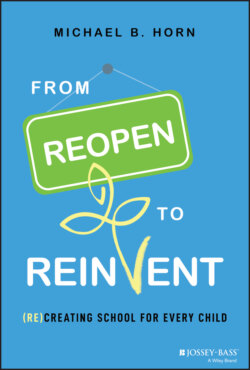Читать книгу From Reopen to Reinvent - Michael B. Horn - Страница 37
AN OPPORTUNITY TO CLARIFY PURPOSE
ОглавлениеIn line with the previous chapter, the pandemic isn't just a threat. It has created an opportunity to have a conversation within individual communities to clarify the purpose of schooling. Many communities are ready for and having this conversation.
Starting in March of 2020, phrases that were considered educational jargon became mainstream in the public conversation about schools. Things like remote learning, virtual learning, online learning, learning loss, hybrid learning, asynchronous and synchronous learning, microschools, and learning pods, as well as questions around what gets taught—like Critical Race Theory—entered the popular verbiage (see Figure 2.1).
Many of the educators with whom I speak aren't thrilled that many of these phrases have become central. They wish we were having conversations about things like social-emotional learning, active learning, mastery-based learning, habits of success, personalizing learning, relationships, agency, skills, supporting the whole child, knowledge, character, lifelong learning, civics, and more.
Figure 2.1 Today's educational jargon
But by making education front and center in many parents' minds and creating radical transparency into what their children were doing every day, the pandemic has created broader and deeper interest in a conversation for which many educators have been clamoring: the purpose of school and how to prepare all students to achieve lifelong success.
That's an opportunity to seize because where there are questions, there is space for answers and solutions.
Without having a conversation to make the purpose explicit—and be clear about people's real differences—it's likely that many schools will return to how they operated prior to the pandemic when they didn't serve large swaths of the population well.
Although there may be a high-level consensus across communities on the purpose of school, there may also be differences—some small and nuanced and others dramatic. That's okay as long as the differences don't result in reduced expectations for certain students just because of their zip code or background. Having different purposes is part of a robust pluralism underlying our democracy that values the fact that students sit in different circumstances and have different needs. Clarity in each schooling community, however, is critical.
